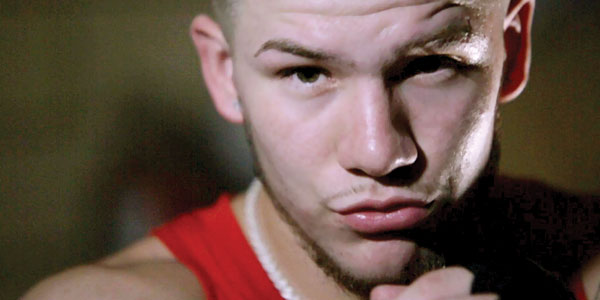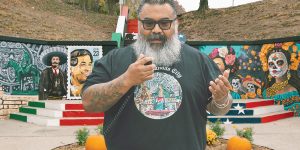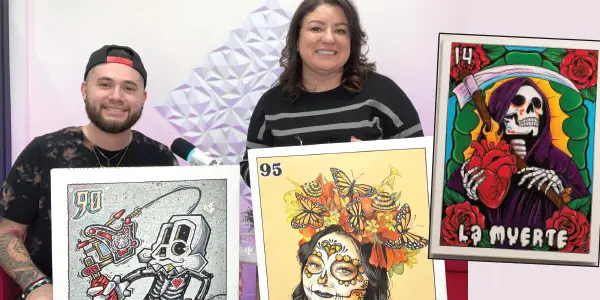
Durante los recientes Juegos Olímpicos de Río de Janeiro, Nico Hernández estaba preparándose para un combate de boxeo. Mientras que él observó su “En este día” de Facebook, una función que le permite mirar a lo que ha publicado en el pasado en ese dia, se dio cuenta de algo.
“Había publicado un estado en el 2012 que iba a estar en los Juegos Olímpicos del 2016”, dijo Hernández. “Se apareció en mi cuenta de Facebook y a mi se me había olvidado.”
Hernández, un hispanoamericano que creció en Wichita, Kan., conocía a los 9 años que quería boxear. Un avance rápido hasta el 2016: su familia y amigos en Wichita estaban dándole porras.
“Realmente no estaba en mis planes ir a las Olimpiadas hasta los 16 años cuando gané (un título en los Olímpicos) los nacionales junior,” dijo Hernández. “La sensación de estar en un pedestal era una buena sensación. Y pensé que, en los próximos cuatro años, yo quería estar allí (en Río) “.
No fue fácil.
Durante los próximos cuatro años, Hernández tuvo que seguir una dieta estricta y una rutina de entrenamiento riguroso. De acuerdo con Hernández, dedicó tanto tiempo entrenando que faltó a días festivos y eventos familiares. Pero él se centró en su objetivo y su familia lo apoyó, incluyendo Lewis Hernández, su padre, quien lo entrenó.
“Tenía que trabajar y criar a otros tres niños por mi cuenta”, dijo Hernández mayor. “Fue muy difícil … pero vi que Nico tenía un buen talento, natural (para el boxeo).”
El joven Hernández tenía toda la intención de ganar el oro para los Estados Unidos. Terminó tercero y llegó a casa con el bronce.
A su regreso a Wichita de Brasil, la comunidad dio la bienvenida al joven luchador como un héroe. Recibió la llave de la ciudad y una beca completa de la Universidad Estatal de Wichita.
El joven Hernández aún no está seguro de sus planes para el futuro; Sin embargo, se espera que se gane la vida como boxeador para mantener a su familia.
“Yo no crecí con un mucho dinero”, dijo. “Crecí muy pobre. Pero vi a una gran cantidad de boxeadores cuidando de sus familias de esa manera. Eso es básicamente lo que me gustaría hacer – convertirlo en una profesión a tiempo completo y cuidar de mi familia, de modo que no tengan que trabajar un día más “.
___________________________________________________________________________________________________________
Latino Olympian recalls his road to Rio
Por Melissa Arroyo
During the recent Summer Olympics in Rio de Janeiro, Nico Hernandez was preparing for a boxing match. While checking his “On This Day” Facebook posts, a feature that lets him look back at what he had posted on a given day in the past, he noticed something.
“I posted a status in 2012 that I was going to be in the 2016 Olympics,” Hernandez said. “It showed up on my Facebook account and I had forgotten about it.”
Hernandez, a Hispanic American who grew up in Wichita, Kan., knew at age 9 that he wanted to box. Fast forward to 2016: His family and friends in Wichita were rooting for him.
“It was really never in my plans to go to the Olympics until I was 16 years old and I won (a title at the) the Junior Olympic nationals,” Hernandez said. “The feeling of being on a podium was a good feeling. And I thought that, in the next four years, I wanted to be there (in Rio).”
It wasn’t easy.
Over the next four years, Hernandez had to follow a strict diet and a rigorous training routine. According to Hernandez, he dedicated so much time preparing that he missed out on holidays and family events. But he was focused on his goal and his family supported him, including Lewis Hernandez, his father, who trained him.
“I had to work and raise three other kids on my own,” the elder Hernandez said. “It was very hard to juggle, … but I saw that Nico had a good, natural talent (for boxing).”
The younger Hernandez had every intention of wining the gold for the United States. He finished third and came home with the bronze.
Upon his return to Wichita from Brazil, the community welcomed the young fighter like a hero. He received the key to the city and a full-ride scholarship to Wichita State University.
The younger Hernandez remains unsure about his future plans; however, he hopes to make a living as a boxer to support his family.
“I didn’t grow up with a lot of money,” he said. “I grew up very poor. But I’d see a lot of boxers taking care of their … (families) like that. That’s basically what I’d like to do – turn it into a full-time profession and take care of my family, so that they don’t have to work another day.”









